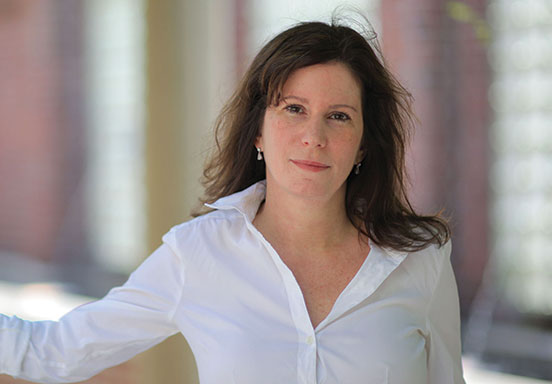Sheila Nirenberg
Sheer Genius
By Paul Grondahl, M.A.’84

Photo credit: John Abbott
Neuroscientist Sheila Nirenberg received a 2013 MacArthur Foundation “genius grant” for deciphering the neural code of the retina and developing a retinal prosthetic device to bring vision to 2 million Americans with advanced-stage blindness. At the University at Albany, however, she initially prepared for a career as a novelist, winning a short-story contest and majoring in English.
Then, senior year, Nirenberg took a course in human genetics with Professor Leonard Lerman. “I was fascinated by the class,” she recalled. “Professor Lerman encouraged me to work in his lab so I could see what it was like to be a scientist. I worked insanely hard, but I loved it. I ended up solving a small problem about DNA mobility and won an award for excellence in research.”
She settled on a neuroscience career after taking a class on the human brain with Distinguished Teaching Professor of Biological Sciences Helmut Hirsch. Nirenberg switched her major to the most closely related topic she had earned enough credits in: psychology.
Before applying to graduate school, Nirenberg worked two years as a lab technician to build up her science background. A denial from the Massachusetts Institute of Technology and assignment to a waiting list by Harvard University didn’t discourage her. “I didn’t have quite enough of the math background they wanted, but luckily, Harvard gave me a chance and I persevered, although I was very quiet and shy in the beginning,” she said. Nirenberg completed her Ph.D. at Harvard in 1993 and was a professor at UCLA for several years. She has worked at Weill Cornell Medical School in New York City since 2005.
The MacArthur award’s international acclaim and $625,000 stipend will help Nirenberg leverage fundraising opportunities. She must raise an additional $4 million of the $6.5 million required to begin the first human clinical trial, in about two years, of a high-resolution retinal prosthetic device that has been tested in mice. Her goal is to develop high-tech eyeglasses that incorporate a camera and gene therapy. The glasses will sidestep damaged retinal cells, curing macular degeneration and other forms of blindness.
For Nirenberg, who still logs 16-hour days in the lab, the “genius” label has delivered unintended benefits. “I was kind of an absent-minded professor before, and now I am free to be eccentric and the true goofball I am,” she said. “I am constantly coming up with bursts of new ideas, and now I can say them out loud without apologizing. In the end, I’m just a nerdy scientist trying to treat blindness and develop robots.”
- UAlbany Magazine
Spring 2014 - Cover Story
- Features
- Departments
- The Carillon
- Past Issues



